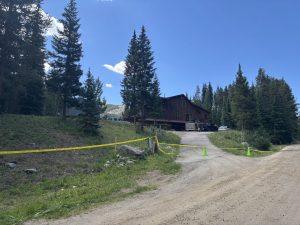Summit County could soon have authority to ask Airbnb and other short-term rental services to remove unlicensed listings
Vacation rental services like Airbnb and Expedia have expressed willingness to work with the government to remove noncompliant listings, according to a staff memo written by Summit County planning department staff

Tripp Fay/For the Summit Daily News
Vacation rental services like Airbnb and VRBO may soon have to work with the Summit County government to remove unlicensed short-term rentals from their platform.
The Summit County Commissioners heard a first reading Tuesday, Aug. 27, of Ordinance 22. Summit County short-term rental program coordinator Brandi Timm said the ordinance would allow the county government to regulate vacation rental services in a limited capacity, as allowed under a state law passed last year.
The ordinance, Timm said, “requires vacation rental services, platforms such as Airbnb, VRBO, to require all listings have a short term-rental registration number on the listing and also requires them to remove any listing should they be in noncompliance with the short-term rental.”
A law passed by the state legislature last year, House Bill 23-1287, allowed for counties to obligate vacation rental services to require a rental license number in any listing on their websites. The state law also allows the vacation rental services to remove a listing from their website if the county notifies them that a short-term rental license has been suspended, revoked or has been issued a notice of violation for not having a license, Timm wrote in a staff memo. The proposed ordinance would adopt these regulatory provisions.
The Summit County government first adopted short-term rental regulations requiring licensure in its Land Use and Development Code in late 2018. The current short-term rental regulation states, “No person or entity may advertise or operate a (short-term rental) without a valid license.”
Enforcing this section of the ordinance currently requires county staff to locate the property owner to get the property into compliance by either removing all advertising or applying for a short-term rental license, according to the staff memo.
But there are difficulties in this process, including having current and correct contact information for the property owner or manager and trying to ensure compliance, Timm wrote. Vacation rental services such as Airbnb and Expedia have indicated their willingness to both require license numbers and remove listings in the limited circumstances outlined in the law, she said.
Timm wrote in the memo that vacation rental services “have a more reliable and accurate ability to assist in removing invalid advertising, subject to all applicable due process requirements under the law, and in requiring that all listings submit a valid (short-term rental) license number.”
Under county ordinance, there is a “robust” process for revocation for license holders found to be in noncompliance, including a mandatory hearing and an opportunity to appeal the outcome of that hearing, Timm said.
When a property is found to be short-term renting without a license, staff contacts the property owner via a written letter of noncompliance that notifies them that they must either apply for a license or stop advertising, according to the staff memo. Under county ordinances, after three written notices, if the property remains noncompliant with short-term rental regulations, a citation is issued.
Ordinance 22 does not change any of these existing short-term rental regulations. But it does allow the county to notify a vacation rental service of a noncompliant property, including a reasonable explanation of the circumstance of the violation, and have that property removed from its online listings.
“This Ordinance 22 will just be an additional tool to help staff enforce on noncompliant properties such as when a property is advertising without a license or if a license were revoked or suspended,” Timm said.
Both Boulder and Douglas counties have updated their short-term rental ordinances to implement the authority of H.B. 23-1287, Timm said. In Boulder County, staff has had one listing removed and no issues working with the listing sites, and in Douglas County staff have had more than 10 listings removed so far and has also had no issues, she said.
Summit County Commissioner Nina Waters asked, “How would this work as far as enforcement when it comes to those who are operating without a license but they’re advertising outside of the typical channels, such as on Facebook or Craigslist?”
Timm replied that the county planning department is working with its current software system host to be able to “scrape” — or use bots to extract content from the internet — platforms like Facebook and Craigslist for local noncompliant listings.
Commissioner Tamara Pogue said, “We did hear from a lot of folks, members primarily actually of the short-term rental community, that they wish we would do a better job of enforcement, and we have certainly struggled, absent having this authority, to do that.”

Support Local Journalism

Support Local Journalism
As a Summit Daily News reader, you make our work possible.
Summit Daily is embarking on a multiyear project to digitize its archives going back to 1989 and make them available to the public in partnership with the Colorado Historic Newspapers Collection. The full project is expected to cost about $165,000. All donations made in 2023 will go directly toward this project.
Every contribution, no matter the size, will make a difference.










